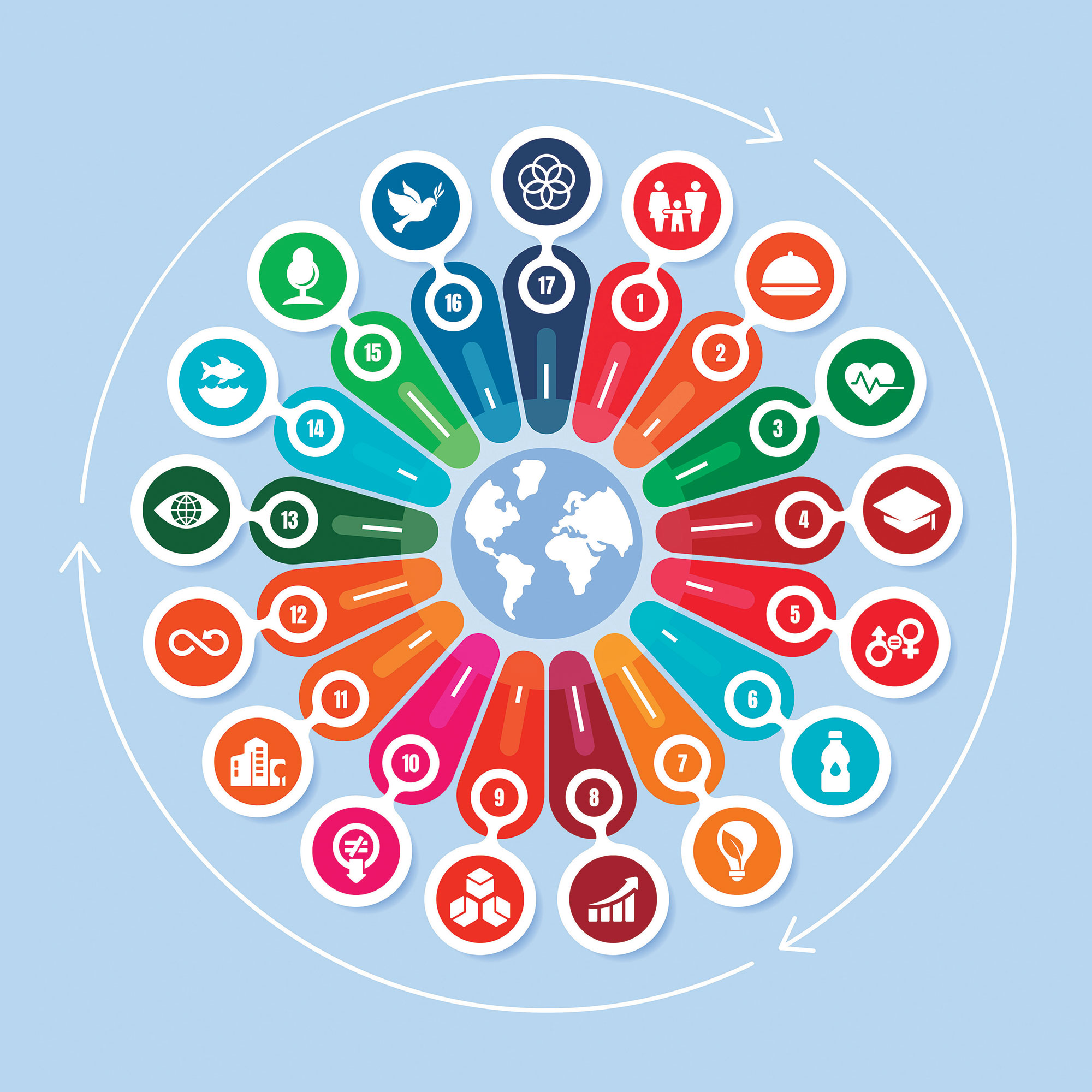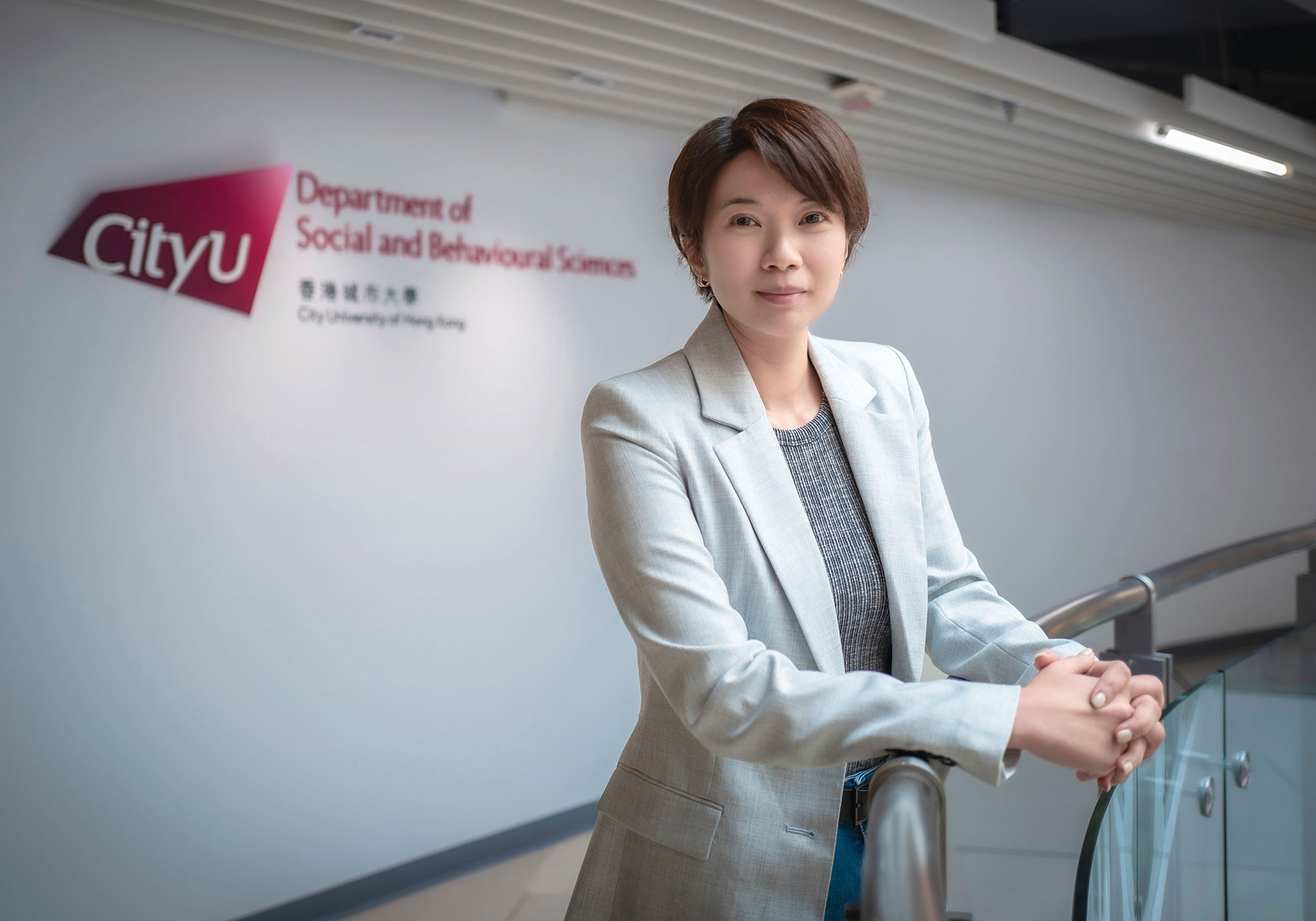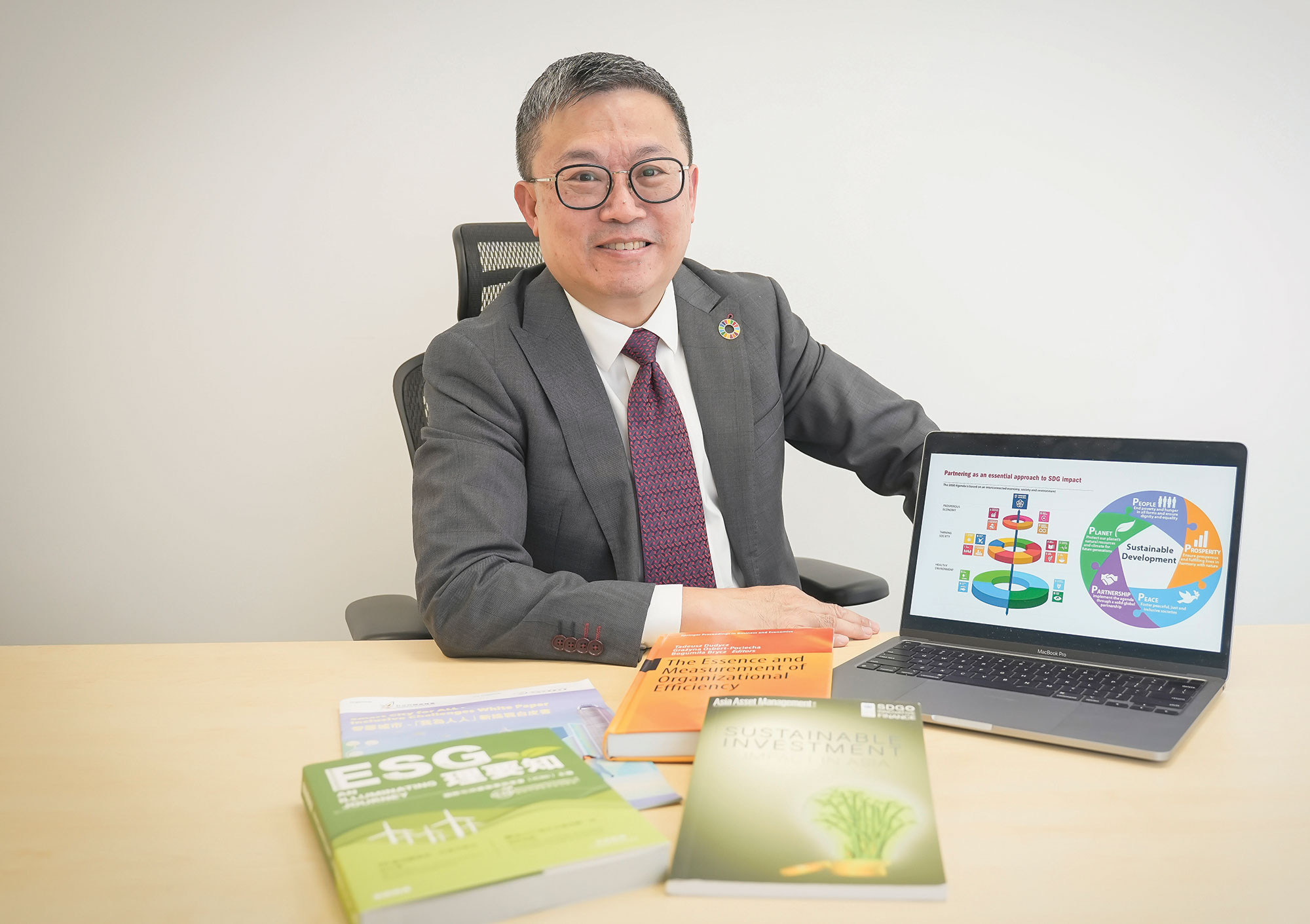Harmony in the Urban Jungle
The United Nations’ Sustainable Development Goals are a call for action to promote prosperity while protecting the planet. Three faculty members from CityUHK’s College of Liberal Arts and Social Sciences share their expert opinions on how we can respond to the unprecedented global challenges through impactful interdisciplinary research
The SDGs comprise 17 interconnected goals, each addressing a specific aspect of sustainable development.

Climate change presents immense challenges but harmony can be achieved when people are provided opportunities for equality and equity.

Wong’s research into green criminology has examined the often unexpected links between organised crime and illegal trade in animals.

Ho believes that inclusive urban designs, such as shared public spaces, can promote social cohesion.

Even in developed urban societies extreme weather can have an impact in the form of heatstroke and dehydration.
It is no easy thing to change the way we live. Real reform requires a buy-in from all segments of society. Whether the goal is humanity peacefully coexisting with the natural world or everyone contributing to an equitable and inclusive society, each individual has a part to play.
Faculty members at City University of Hong Kong’s (CityUHK) College of Liberal Arts and Social Sciences (CLASS) have heard the call. They have been working within their expert fields to contribute to the United Nations’ Sustainable Development Goals (SDGs), which aim to achieve a better future for all. Their collective efforts have helped pave the way towards a more sustainable and harmonious Hong Kong—but they are not finished yet. They have new ideas on what more humanity could do.
“I think first and foremost we have to realise that everything is interconnected,” says Professor Rebecca WONG, Associate Professor at the Department of Social and Behavioural Sciences.
She says that reading the 17 SDGs makes it easy to understand that the problems affecting developed countries are in fact the very same ones facing developing countries.
“If you boil it down, we are all facing the same issues, such as climate change. We are bound by the same forces, the same notions, the same environment. What’s important is that at the end of the day, these goals bring everyone together to address the same topics about the environment, animals and creating a more harmonious society,” she says.
Accordingly, the SDGs, also known as the Global Goals, were developed in 2015 as a universal call to action to end poverty, protect the planet and ensure that all people can enjoy peace and prosperity by 2030.
Empathy for People and Planet
As such, Professor Ilex LAM, Adjunct Professor at the Department of Public and International Affairs notes that while the developmental goals are focused on the five Ps—people, planet, prosperity, peace and partnerships—it should be remembered that caring underscores everything.
“We have to remind ourselves to be caring to the planet, caring about prosperity, caring about people, caring about partnerships, and at the end, is the achievement of peace,” he says.
Achieving such lofty aims is easier said than done and the question remains: how can we foster harmony in society?
According to Lam, harmony can be achieved when a society can focus on collaborations that promote the efficient allocation of resources. He emphasises the need for inclusivity in achieving equality and the importance of equity.
Professor Derrick HO, Assistant Professor at the Department of Public and International Affairs, agrees, presenting his views that community participation and engagement, and participatory urban planning are hugely important when addressing social needs.
“These can help design more inclusive communities,” he explains. “Social interventions and innovations that build a sense of place and identity within communities, such as shared gardens and shared public spaces, can really promote social cohesion.”
What’s important is that at the end of the day, these goals bring everyone together to address the same topics about the environment, animals and creating a more harmonious society
Professor Rebecca Wong
Equal Rights and Opportunities
In a city like Hong Kong where urban development is subject to the needs of commercialisation and gentrification, Ho emphasises the need for inclusive urban designs. This circles back to what Lam says about equality versus equity.
Lam notes that in today’s society, there aren’t enough opportunities and resources for marginalised groups like the disabled, ex-offenders and those in poverty. He argues that more needs to be done to create equal opportunities for career advancement, education and appreciation. And a lot of it boils down to resource allocation.
“It all comes back to the question of equal opportunity,” according to Ho. “Do I have the opportunity for capacity building, education and learning, and do I have the same opportunity to enjoy and appreciate a bus ride, perceive a path to getting promoted, and enjoy mobility of labour? These are all questions that need to be asked.”
Yet while Hongkongers generally enjoy a high level of education and excellent infrastructure, income inequality and equity in resource distribution remain a concern and housing issues continue to divide society.
“We have to be aware of the fact that there’s no equality, and depending on who you talk to and what their background is, there is never going to be an agreement on what equality looks like, but it shouldn’t be a competition,” Wong says.
Indeed, the three professors agreed that taken together, some of the issues dogging the improvement of Hong Kong’s harmony include housing, climate change, the relatively low happiness index, and the mental effects and fallout of COVID-19.
It all comes back to the question of equal opportunity. Do I have the opportunity for education and learning, and do I have the same opportunity to enjoy and appreciate a bus ride, perceive a path to getting promoted, and enjoy mobility of labour?
Professor Derrick Ho
Heat as the Silent Killer
According to Ho, many societal problems stem from housing issues. Especially in Hong Kong, a shortage of public housing and long waiting lists can exacerbate issues such as immigration, health and harmony.
“The fact is we are in an ageing society, and we have ageing buildings that are hard for redevelopment, but people still need to live, but maybe they cannot change their living environment, so they live in subdivided flats where the conditions are horrible,” he explains.
Ho notes that especially with extreme weather patterns, small and cramped living spaces may not be adequately ventilated or able to retain heat. Some might not even have air-conditioning capacities or windows. The bad consequences were obviously shown during COVID-19 when social distancing was practised and people have nowhere to go except staying home. So, it is not surprising to see health risks increasing.
“If you stay in such a room during summer, you could get dehydrated or a heatstroke, and that’s just the start,” he says.
Wong agrees, adding that cramped living spaces and climate change can affect the harmony and balance between humans and animals. This is worsened with unregulated pet trades or the exploitation of animals. She adds that part of the problem in urban societies like Hong Kong, where shopping malls may predominate, is that people might not necessarily make the connections between their living spaces and the natural environment.
In her study and research of green criminology, she has looked at the impact of organised crime and the illegal trade of animals, and says that most people think these issues are isolated.
“Very few people know this, but hotter temperatures, for example, lead to aggressive behaviour and people are more likely to commit violent crime when the temperature is higher. This is proven in academic studies, and is called the heat-aggression hypothesis,” she says.
Another issue is the introduction of diseases. Wong says that when people learn about a puppy farm in the New Territories, they might not make the connection as to how the farm could affect their lives, especially if they live in the city. But the reality is that the illegal capture or trade of animals into Hong Kong can bring diseases that can jump to humans, such as swine flu. And it can also go the other way when humans infect animals.
“The human linkage isn’t always widely recognised,” she says.
Then, of course, there is the issue of air pollution. Wong notes that there is also crime “in the air”. Studies have shown that air pollution can increase in the stress hormone cortisol which cause people to have more violent behaviours. Aside from the impact on human health, air pollution affects bees, but what most people do not realise is that bees are pollinators.
“If you take bees away from the planet, you’ll see half the produce at supermarkets gone and prices will go up, so we can’t be so ignorant,” she says.
And all this ultimately affects the one thing that can promote social cohesion—people’s happiness.
Ominously, Lam notes that while Hong Kong people live a relatively good life compared to other countries, the city has one of the lowest happiness indexes in the world. He says that Hong Kong residents tend to prioritise family harmony over individual happiness and that housing and job insecurity are major concerns.
“There is a shift from ‘salaryman’ to ‘businessman’ and this is changing the way people approach work and life,” he says. “There is a focus on aligning resources and finding purpose. This is why it is important to address the issues around equity and equality in government policies—Hong Kong’s low happiness index is a concern.”
Technology Supports Inclusivity
Ho shares similar views, adding that creating a harmonious society also means addressing everyone’s basic happiness.
“What then are the lowest common denominators that we need to do to prioritise people’s happiness and to try and create a more equitable society?” he asks.
The general agreement is on building a smart and inclusive city, focusing on community building and aligning policies.
“When you look at a smart city framework, we can use technology to create opportunities and become more inclusive in society,” Lam says. However, he cautions that too much focus on technology can also create digital divide challenges for some segments of society such as the elderly and the disabled. He stresses that policymakers need to be mindful of this.
But for urban planning and community building, Ho sees the advent of technology and data as key components for inclusivity.
It is important to address the issues around equality—Hong Kong’s low happiness index is a concern
Professor Ilex Lam
For example, he notes that AI can help to analyse society’s intentions and needs by providing an understanding of its behaviours, needs and wants.
“We can actually do more things and support society when we plan and design urban spaces,” he says. And this is an important aspect of building a harmonious society.
“Everyone needs to get together to make resource use efficient, share knowledge, data and information, as well as share technology so that the government can use all available resources to properly address the needs in society,” Lam says.
Communication is also key. The professors hope that through their research and lectures they will be able to impart to students and the wider society the message that everyone can make a small change and that together, they can create bigger impacts.
“It can be small things, like pet adoptions—‘adopt don’t buy’. These things don’t just affect humans, it’s all part of a bigger ecosystem,” Wong says. “So just be a good person and don’t think of only yourself, because everything is interconnected.”




